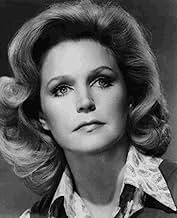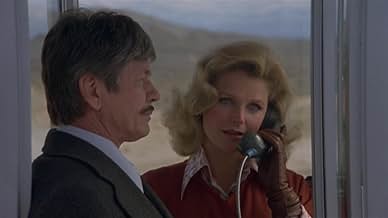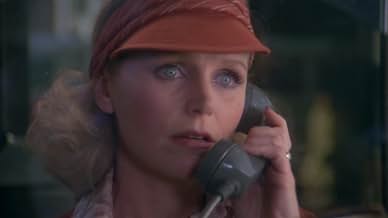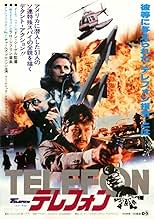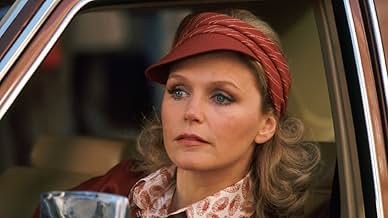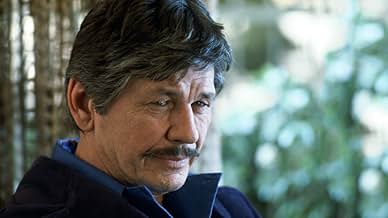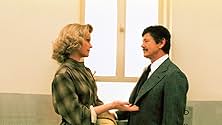PUNTUACIÓN EN IMDb
6,5/10
6,6 mil
TU PUNTUACIÓN
Un oficial ruso es enviado a EE. UU. Para intentar detener a agentes inactivos que atacarán inconscientemente organismos gubernamentales cuando escuchen ciertas palabras codificadas.Un oficial ruso es enviado a EE. UU. Para intentar detener a agentes inactivos que atacarán inconscientemente organismos gubernamentales cuando escuchen ciertas palabras codificadas.Un oficial ruso es enviado a EE. UU. Para intentar detener a agentes inactivos que atacarán inconscientemente organismos gubernamentales cuando escuchen ciertas palabras codificadas.
- Dirección
- Guión
- Reparto principal
- Premios
- 1 nominación en total
Regis Cordic
- Doctor
- (as Regis J. Cordic)
Reseñas destacadas
If you look at the history of American Cold War films, you see they often, but not always reflect the current state of Western-Soviet relations. Many of the B-movies of the 1950's reflected the anti-communist paranoia that existed stateside; and that decades's Invasion of the Body Snatchers (also directed by Don Siegel) brilliantly parodied McCarthyism. Now we find ourselves in the late 1970's. Gone are Stalin and Kruschev - now we have Breznev and Nixon/Ford and Jimmy Carter and a gradual policy of rapprochement and cooling of tensions. In this film, neo-Stalinists are purged by the pro-Détente Soviet leadership. One such old guard agent, played by Donald Pleasance (who is always in fine form with these 'oily' character representations) decides to unleash an old Soviet conspiracy hatched by leaders in the 50's and unknown to most of the current Soviet brass. I am not going to rehash the entire plot, but let it suffice to say that we have a top Soviet Army General (played by Charles Bronson who mercifully does not even attempt a Russian accent) working together with American double agent Lee Remick, to battle forces more sinister than the current leadership of either the US or the USSR. This truly is the movie that best reflects the détente political philosophy in vogue at this time.
I've always liked this movie. But watching it now it is difficult not to laugh out loud at the ridiculous scenes featuring Tyne Daley and her "supercomputer." This stuff was out of date when the film came out, relying on "Lost in Space" style simplicity.
But that's forgivable. What really kept the flick from really being a classic, however, is that it is totally missing the third act! The film ends abruptly with the villain, Dalchimsky, done away with in a fairly simple manner in the small town bar. In the novel, Dalchimsky is also killed in the bar, but not before passing along the coded message that set off the last "sleeper" who then proceeds to make his way to blow up Hoover Dam (or some big damcan't remember off the top of my head). Then Bronson and Remick's characters had to race to stop the impending disaster. It was a big, exciting ending and I can't understand why they left it out. Maybe they just didn't have the budget. I think spending the dough it would have taken to include the book's ending would have helped mitigate the low budget "TV Movie" feeling "Telefon" often suffers from. But producers knew that Bronson's name would consistently pull a certain audience no matter what, so they rarely tried to do anything big in his films and he never insisted on ita fact that eventually led to the decline of his career.
But that's forgivable. What really kept the flick from really being a classic, however, is that it is totally missing the third act! The film ends abruptly with the villain, Dalchimsky, done away with in a fairly simple manner in the small town bar. In the novel, Dalchimsky is also killed in the bar, but not before passing along the coded message that set off the last "sleeper" who then proceeds to make his way to blow up Hoover Dam (or some big damcan't remember off the top of my head). Then Bronson and Remick's characters had to race to stop the impending disaster. It was a big, exciting ending and I can't understand why they left it out. Maybe they just didn't have the budget. I think spending the dough it would have taken to include the book's ending would have helped mitigate the low budget "TV Movie" feeling "Telefon" often suffers from. But producers knew that Bronson's name would consistently pull a certain audience no matter what, so they rarely tried to do anything big in his films and he never insisted on ita fact that eventually led to the decline of his career.
This isn't the most well-known movie in the world, so I really wonder if anyone realized that the Zucker/Zucker/Abrams team that made the original "Naked Gun" copied the whole idea of everyday people activated as assassins with bizarre catchphrases directly from this movie (remember the scene in which Ricardo Monalban "activates" his sweet elderly secretary, played coincidentally by the Zuckers' own mother, to go on a shooting rampage). I have no doubt about it: I went to the U.S. premier of "Naked Gun 33 1/3" in Milwaukee (the hometown of myself and the filmmakers) at which David Zucker said that for each of their movies, they would copy plot lines directly from serious, sometimes obscure genre films like this. I thought of this movie immediately when I saw "Naked Gun" for the first time. When you think about it, the central idea of everyday people becoming murderous robots just by hearing a stanza from Robert Frost is pretty funny by itself, and the Zuckers milked all the absurdity they could from it.
I have rather fond memories of watching this film when it was broadcast at odd hours on a local independent television station. The ideas this movie adapted from Walter Wager's original novel were quite creative, but I recall the acting of everyone here to be pretty bad (especially leads Bronson and Remick). The old-fashioned '70s computers, rotary phones, and Cold War ultra-seriousness further diminish its effectiveness. This isn't the kind of movie MGM is probably anxious to reissue on a deluxe DVD - probably because its two stars and director are all deceased, but it is a reasonably entertaining film to catch on television.
I have rather fond memories of watching this film when it was broadcast at odd hours on a local independent television station. The ideas this movie adapted from Walter Wager's original novel were quite creative, but I recall the acting of everyone here to be pretty bad (especially leads Bronson and Remick). The old-fashioned '70s computers, rotary phones, and Cold War ultra-seriousness further diminish its effectiveness. This isn't the kind of movie MGM is probably anxious to reissue on a deluxe DVD - probably because its two stars and director are all deceased, but it is a reasonably entertaining film to catch on television.
Riveting political thriller. Bronson plays a Russian intelligence major assigned to stop programmed Stalinist agents from carrying out a possible doomsday plan. Bronson's a member of a reformist wing of the Soviet Communist Party that has replaced hardline Stalinists. However, the earlier doomsday plan remains in effect, and now it's being executed in the US by a renegade Soviet agent (Pleasance). Fortunately for Bronson, the winsome Remick is assigned by Soviets to assist him. Problem is if Pleasance is not stopped he could well set off a nuclear catastrophe.
The movie has two elements from earlier Cold War films: The Manchurian Candidate (1962) and Dr. Strangelove (1964). Like Laurence Harvey in the former, agents here are programmed by trigger words to carry out their mission in robotic fashion. At the same time, there's the overhang of a possible doomsday as in Strangelove. Here those elements are skillfully blended to build suspense.
What really distinguishes the film, however, is an overall absence of Cold War good guys and bad guys. There's really only one villain, the unreformed Stalinist. Unlike 50's Cold War films, this one treats operatives of both sides strictly as professionals doing their duty without noticeable favorites. One possible exception is Remick. Despite her coy girlish manner, she's also been assigned to eliminate partner Bronson once he succeeds in killing Pleasance. That way, no one will be left to spill the beans about the aborted plan and embarrass the new Soviet regime. So Bronson is to be rewarded by his superiors with death. Maybe that's a good enough reason, but not unarguably so.
Meanwhile, Bronson's his usual steely self, while Remick plays up the girlish appearance, leaving us to guess how much of a façade it is. But stealing the show is Tyne Daly as the plain-looking brain behind the American side. Her superiors appear rather addled much of the time, while she deftly maneuvers clues behind her bank of computers. Good touch. Most of the action comes from explosions that blow up real good. I don't know how they did them in 1977, but they're impressive as heck.
Anyway, the movie suggests a possible waning of Cold War passions on our side, perhaps because of growing recognition of what a nuclear exchange would entail. Be that as it may, the movie remains a taut and under-rated political thriller, helmed by the masterful Don Siegel.
The movie has two elements from earlier Cold War films: The Manchurian Candidate (1962) and Dr. Strangelove (1964). Like Laurence Harvey in the former, agents here are programmed by trigger words to carry out their mission in robotic fashion. At the same time, there's the overhang of a possible doomsday as in Strangelove. Here those elements are skillfully blended to build suspense.
What really distinguishes the film, however, is an overall absence of Cold War good guys and bad guys. There's really only one villain, the unreformed Stalinist. Unlike 50's Cold War films, this one treats operatives of both sides strictly as professionals doing their duty without noticeable favorites. One possible exception is Remick. Despite her coy girlish manner, she's also been assigned to eliminate partner Bronson once he succeeds in killing Pleasance. That way, no one will be left to spill the beans about the aborted plan and embarrass the new Soviet regime. So Bronson is to be rewarded by his superiors with death. Maybe that's a good enough reason, but not unarguably so.
Meanwhile, Bronson's his usual steely self, while Remick plays up the girlish appearance, leaving us to guess how much of a façade it is. But stealing the show is Tyne Daly as the plain-looking brain behind the American side. Her superiors appear rather addled much of the time, while she deftly maneuvers clues behind her bank of computers. Good touch. Most of the action comes from explosions that blow up real good. I don't know how they did them in 1977, but they're impressive as heck.
Anyway, the movie suggests a possible waning of Cold War passions on our side, perhaps because of growing recognition of what a nuclear exchange would entail. Be that as it may, the movie remains a taut and under-rated political thriller, helmed by the masterful Don Siegel.
Telefon casts Charles Bronson as a KGB agent on assignment in America trying to stop Donald Pleasance from igniting World War III. Bronson is aided and abetted uneasily by CIA agent Lee Remick and the two of them get involved with each other as well as the mission at hand.
It's quite a mission they have, Pleasance is an old line Stalinist and he's noticed the new regime is slowly doing away with his kind. So he knows about this operation involving 51 Manchurian candidates who are Russian sleeper agents the way Laurence Harvey was in the Manchurian Candidate. With the proper phrase these people who are under hypnosis and just living regular humdrum lives get a signal to complete a mission involving sabotage of some military installation in their area. Pleasance has come to America to set these agents off.
It might have been a whole lot easier to just dial long distance once he was out of the Soviet Union, but apparently Pleasance is also getting a few jollies and really wants to see his handiwork. Bronson gets the list and follows Pleasance's trail hoping to head him off.
A nice cast of talented players pulls off and makes entertaining when you think about it, a really silly Cold War era story. Pleasance as usual pulls all the stops out as the villain and Bronson is his usual menacing self. His loyal legion of fans might like Telefon, I'm kind of partial to it myself, but I recognize it's illogicality.
It's quite a mission they have, Pleasance is an old line Stalinist and he's noticed the new regime is slowly doing away with his kind. So he knows about this operation involving 51 Manchurian candidates who are Russian sleeper agents the way Laurence Harvey was in the Manchurian Candidate. With the proper phrase these people who are under hypnosis and just living regular humdrum lives get a signal to complete a mission involving sabotage of some military installation in their area. Pleasance has come to America to set these agents off.
It might have been a whole lot easier to just dial long distance once he was out of the Soviet Union, but apparently Pleasance is also getting a few jollies and really wants to see his handiwork. Bronson gets the list and follows Pleasance's trail hoping to head him off.
A nice cast of talented players pulls off and makes entertaining when you think about it, a really silly Cold War era story. Pleasance as usual pulls all the stops out as the villain and Bronson is his usual menacing self. His loyal legion of fans might like Telefon, I'm kind of partial to it myself, but I recognize it's illogicality.
¿Sabías que...?
- CuriosidadesDirector Don Siegel asked Charles Bronson to shave his trademark mustache off for this movie. Bronson replied, "No mustache, no Bronson." Siegel said in his book 'A Siegel Film: An Autobiography', "I felt that as much as Bronson wore a heavy mustache in Russia, it would help his disguise if he had no mustache when he arrives in Canada. However he didn't want to shave it off."
- PifiasAll of the KGB characters shown in uniform at the beginning of the film are "out of uniform." Although Borzov, Bronson's character, and the others are clearly meant to be in the KGB, the uniforms they wear are trimmed in red, the color of the regular Soviet Army, not the KGB. During the era of the film KGB uniforms were trimmed in Royal Blue. Also, the uniforms in the film lack the distinctive "Sword and Shield" patch worn by KGB officers on their jacket and coat sleeves.
- Citas
Nicolai Dalchimsky: The woods are lovely, dark, and deep, but I have promises to keep. And miles to go before I sleep, and miles to go before I sleep. Remember. Miles to go before I sleep.
- ConexionesFeatured in 42nd Street Forever, Volume 3: Exploitation Explosion (2008)
- Banda sonoraThe Yellow Rose of Texas
(uncredited)
Traditional American folk melody
Selecciones populares
Inicia sesión para calificar y añadir a tu lista para recibir recomendaciones personalizadas
- How long is Telefon?Con tecnología de Alexa
Detalles
- Fecha de lanzamiento
- País de origen
- Idioma
- Títulos en diferentes países
- Telèfon
- Localizaciones del rodaje
- Helsinki, Finlandia(Moscow, Leningrad, Russia, ten days)
- Empresa productora
- Ver más compañías en los créditos en IMDbPro
Taquilla
- Presupuesto
- 7.000.000 US$ (estimación)
- Duración
- 1h 42min(102 min)
- Mezcla de sonido
- Relación de aspecto
- 1.85 : 1
Contribuir a esta página
Sugerir un cambio o añadir el contenido que falta


